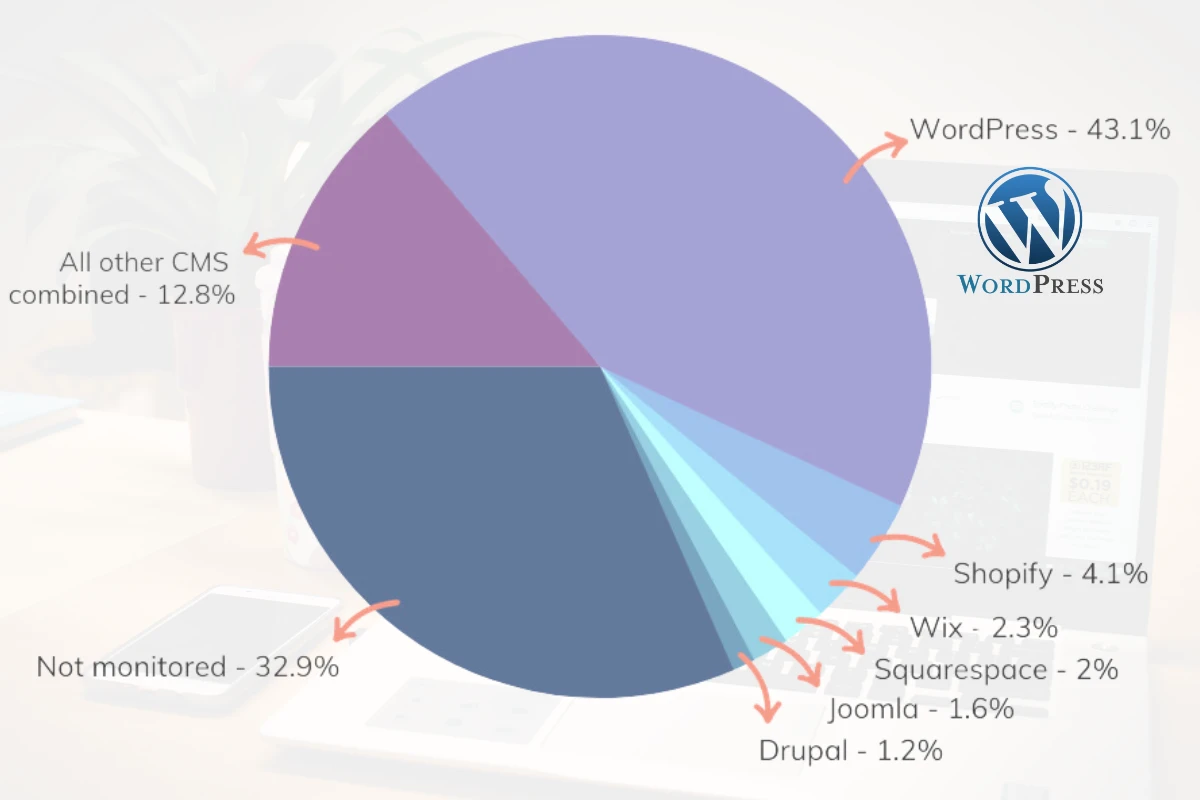Entering the world of website creation can be a daunting journey, especially when it comes to choosing the right content management system (CMS) for your site. With so many platforms available, each with its own pros and cons, it’s easy to get overwhelmed.

Yet, amidst this sea of options, one name stands out from the rest – WordPress. This CMS, known for its recognizable “W” logo, is more than just another platform; it’s a tool that has fundamentally changed the way we create and manage digital content. But why does WordPress dominate the CMS market? In this blog post, we’ll delve into the many factors that contribute to WordPress’s success, and why, even after so many years, it continues to reign supreme.
The State of the CMS Market
As of now, the CMS market is more competitive than ever. A wide variety of platforms, each with unique capabilities and designed to cater to specific needs, jostle for space in this crowded landscape. From simple blogging tools to complex eCommerce solutions, the CMS market has everything that a budding web developer or seasoned professional could dream of.
But if we take a closer look at the numbers, we’ll find that one platform has consistently stayed ahead of the rest: WordPress. According to recent data from W3Techs, as of July 2023, WordPress powers an impressive 42% of all websites on the internet. That’s an extraordinary feat considering its humble beginnings as a simple blogging tool.

Meanwhile, its closest competitors, Joomla and Drupal, lag far behind, with market shares of just 3.1% and 1.7% respectively. Other CMS platforms like Shopify and Squarespace, despite their rising popularity, still only represent a small fraction of the market.
But the question that begs to be asked is, why? Why has WordPress managed to dominate this market in such a way? The answer, as it turns out, lies in a combination of factors that we will explore in the next sections.
Why WordPress Dominates: Key Reasons
- Ease of Use: WordPress is renowned for its user-friendly interface. Even those with no coding experience can create a fully functional website in no time.
- Extensive Plugin Library: With over 50,000 plugins, WordPress allows users to add nearly any functionality to their site without touching a single line of code.
- Themes Galore: WordPress offers thousands of free and premium themes, catering to all kinds of website design needs.
- Strong Community Support: WordPress’s large and active community means that help is always available. From forums to blogs, there are plenty of resources for WordPress users.
- SEO Friendly: WordPress comes with excellent SEO tools and plugins, which help websites rank higher on search engines.
- Flexibility: From blogs to e-commerce stores, WordPress can handle it all. Its versatility is unparalleled in the CMS world.

What About Other CMS Platforms?
While WordPress might be the king of the CMS world, it doesn’t mean other players don’t have their strengths or niches.
- Joomla: Joomla stands out for its ability to handle complexity, large volume, and extensibility. It might have a steeper learning curve than WordPress, but it is a go-to choice for developers looking for more in-depth functionality.
- Drupal: Drupal is loved by developers for its advanced and high-quality coding, robust security, and scalability. However, it requires more technical expertise and has a steeper learning curve.
- Wix: Wix is appreciated for its beginner-friendly, drag-and-drop interface and large selection of templates. Yet, when it comes to flexibility and advanced features, it falls behind WordPress.
- Squarespace: Known for its aesthetically pleasing, designer-quality templates, Squarespace is a top choice for creatives. However, it doesn’t quite match the level of customization and functionality that WordPress offers.
- Shopify: Shopify is an e-commerce specialist. If an online store is all you need, Shopify shines with its simplicity and dedicated e-commerce features. Yet, for a more comprehensive site, WordPress, with its WooCommerce plugin, still holds the edge.
Despite their strengths, none of these platforms have managed to attain the versatility, ease of use, and sheer breadth of options that WordPress provides, further underlining why WordPress dominates the CMS market.
The Future of WordPress and the CMS Market
The CMS landscape is evolving rapidly, but WordPress seems primed to maintain its dominance. With the Gutenberg block editor maturing and the continued growth of the WordPress plugin and theme ecosystem, the platform is becoming even more versatile.
Furthermore, the focus on the democratization of publishing and the strong community backing ensures that WordPress continues to evolve with the needs of its users.

While it’s hard to predict exactly what the future holds, one thing seems certain: WordPress isn’t going anywhere. It’s more than just a platform; it’s a thriving community and a comprehensive toolset that’s well-equipped to handle whatever comes next in the world of web publishing.
Conclusion
In the end, the reason why WordPress dominates the CMS market boils down to its flexibility, ease-of-use, and vast community support. Whether you’re a beginner building your first website, a business owner wanting full control of your online presence, or a developer looking for a robust platform, WordPress delivers.
Despite the competition, WordPress continues to innovate and grow, adapting to the needs of an ever-changing digital landscape. And as long as that remains the case, we can expect WordPress to remain at the top of the CMS world.
In the battle for CMS dominance, it seems the WordPress lion isn’t ready to give up its crown just yet. And why should it? After all, it’s earned it.

